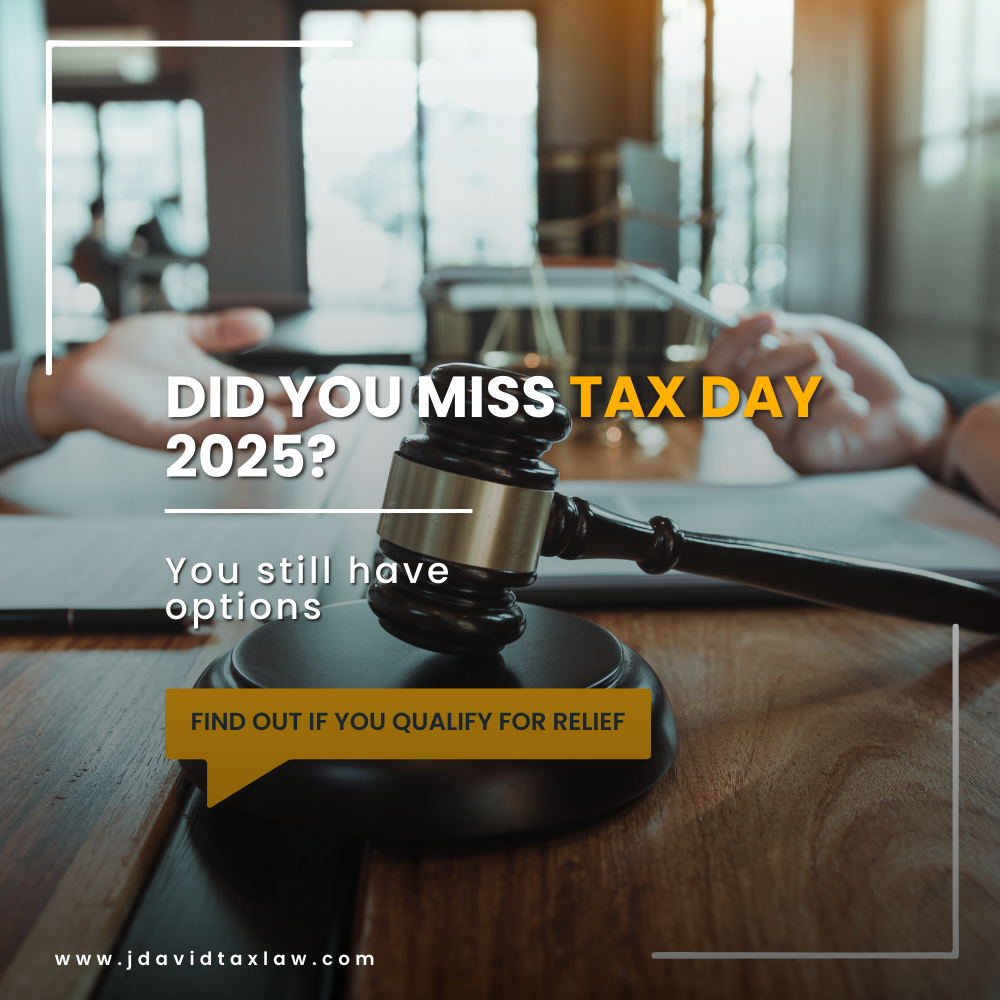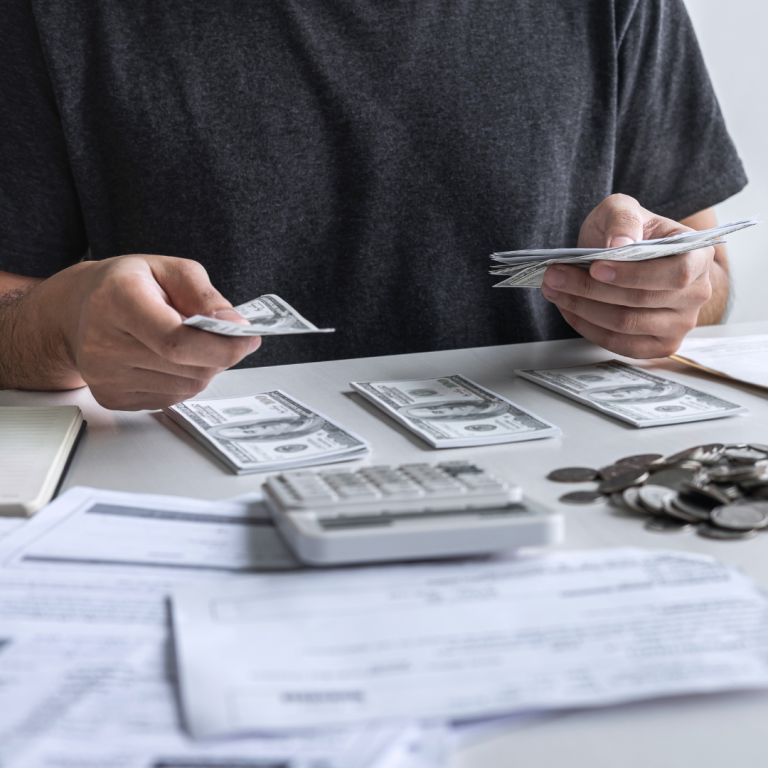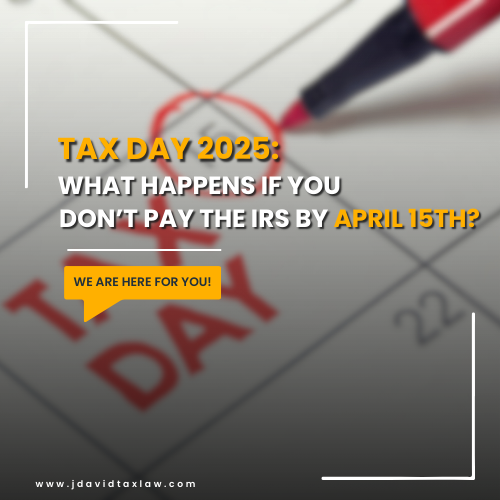
Missed the April 15 Tax Day 2025 deadline? Learn about IRS penalties, late payment relief, and how to settle your tax debt. Call us at (888) 342-9436.





Many entrepreneurs find themselves struggling with tax debt due to a combination of inadequate tax monitoring, irregular income patterns, and a lack of understanding of their tax obligations. These challenges are compounded by the penalties and interest that accrue when taxes are underpaid or filed late.
Unlike traditional employees, self-employed individuals are responsible for managing their own tax payments. This responsibility includes not only federal and state income taxes but also self-employment taxes that cover Social Security and Medicare contributions.
Keep reading as we discuss the root cause of tax debt among the self-employed in Baltimore. We aim to provide practical steps to tackle this issue and discuss how partnering with tax professionals like J. David Tax Law can offer tax relief and resolution.
The first step for any self-employed individual grappling with tax debt is to gain a complete and accurate understanding of their financial situation. This process begins by gathering all pertinent financial documents. This includes which include bank statements, invoices, receipts, and prior tax returns.
Organizing these documents provides a clear picture of your income streams, expenses, and tax obligations. Doing this can help to form the foundation for all your subsequent tax-related decisions.
Here are some actionable steps to effectively assess your financial situation:
Gather and Organize Financial Documents: Collect all financial records for at least the past three years. Use folders or digital tools to categorize and store these documents for easy access.
Review Past Tax Returns: Look over your previous tax returns to check for any errors or missed opportunities for deductions. Understanding past filings is crucial for correcting mistakes and making informed decisions moving forward.
Utilize Financial Software: Consider using accounting software to track your income and expenses accurately. Tools like QuickBooks and FreshBooks can help you maintain a real-time overview of your financial health.
Analyze Income and Expenses: Break down your income and expenses to understand where your money comes from and where it goes. This analysis can highlight areas where you can cut costs or better manage your tax withholding.
Identify Financial Trends: Look for patterns that might affect your tax situation, such as seasonal income spikes or recurrent high expenses. Recognizing these trends will allow you to plan for similar events in the future.
One of the most crucial steps you can take when facing tax debt is to seek the guidance of a tax professional as soon as possible. Self-employed individuals can benefit immensely from expert advice tailored to their unique financial situations.
Tax debt lawyers at J. David Tax Law are not only equipped to handle the intricacies of tax law but is also experienced in crafting personalized tax relief strategies. Here’s how our tax law firm can help you:
Set up a manageable installment agreement payment plan with the IRS.
Negotiate with the IRS to possibly reduce the total amount you owe in tax debt
Assistance in resolving tax liens to clear claims against your property.
Solutions to lift levies on your bank accounts or property to regain control of your assets.
We can work to modify or stop wage garnishments to protect your income.
Determine if you qualify for this offer in compromise and assist in making an offer to settle your tax debt for less.
Our tax debt attorneys will represent you and ensure that your rights are protected.
Petition for the reduction or removal of penalties due to late taxes and reduce your debt load.
We will scrutinize your IRS account to understand your tax issues deeply and find appropriate resolutions.
Exploring payment plans and settlement options is often a critical step towards financial recovery. These mechanisms are designed to provide relief by making tax liabilities more manageable.
Understanding and accessing the right payment plans or settlement options can be crucial in finding a manageable path forward. The IRS provides several avenues to assist taxpayers in resolving their debts, tailored to different financial situations. Here are some of the most relevant options for self-employed individuals in Baltimore:
IRS Tax Installment Agreements
By breaking down overwhelming tax debts into smaller, more manageable payments, you can reduce the debt amount owed and achieve financial relief. These help to prevent financial strain and allow for continued business operations without the threat of more severe IRS enforcement actions.
In such cases, applying for temporary relief from the IRS can provide essential breathing space, allowing you to stabilize your finances without the added pressure of immediate tax payments. The IRS offers several types of temporary relief, each designed to accommodate different financial hardships.
If your monthly necessary living expenses exceed your monthly income, you might qualify for CNC status. Being placed on CNC status means the IRS temporarily halts all collection activities, including levies and property seizures. This status does not forgive the tax debt but suspends collections until your financial situation improves. During this time, the statute of limitations to collect the tax debt continues to run for the IRS, who has 10 years to collect taxes from the date of original assessment.
For shorter-term relief, requesting an extension to pay your taxes might be appropriate. This can be particularly useful if you expect to resolve your financial shortfall shortly, such as receiving payments for pending invoices or finalizing business deals.
The IRS may also grant a payment extension, typically of up to 120 days, without requiring a formal payment plan. This short-term extension can be helpful if you need a little extra time to gather funds.
Failing to pay taxes on time can result in substantial penalties and interest charges that compound over time. These additional costs can make the original tax debt much more burdensome and difficult to clear.
Thus, preventing future tax debt is as crucial as resolving current liabilities. Establishing sound financial practices can help you avoid the pitfalls of tax debt accumulation and ensure long-term financial health. Here are strategic steps to manage your finances more effectively:
Maintain Accurate and Timely Bookkeeping
Make Quarterly Estimated Tax Payments
Plan for Tax Liability Ahead
Seek Professional Tax Advice Regularly
Invest in Tax Monitoring services
Educate Yourself on Tax Matters
Implementing these strategies requires effort and diligence but is crucial in avoiding the stress and financial strain of tax debt.
Furthermore, effective tax monitoring and compliance can help you take advantage of tax deductions, credits, and other benefits legally available to reduce your taxable income. Without a strategic approach to taxes, you may miss out on opportunities that could significantly lower your tax obligations.
Tax debt can put your personal and business assets at risk. Thus, it is important to stay compliant with tax obligations. It also keeps the IRS at bay but also enhances your reputation among clients, investors, and financial institutions.
At J. David Tax Law, we understand that each individual’s tax situation is unique. That is why our tax debt attorneys are committed to providing personalized, strategic tax solutions that address your specific tax resolution needs.
Taking proactive steps now can save you from future financial hardship and the stress that comes with it. Contact J. David Tax Law today to schedule a consultation, and let us help you secure a financially stable future free from tax debt.
Our tax relief attorneys specialize in tax problems and tax debt resolutions
Get started with a 100% free consultation

Missed the April 15 Tax Day 2025 deadline? Learn about IRS penalties, late payment relief, and how to settle your tax debt. Call us at (888) 342-9436.

IRS grants a tax deadline extension to California wildfire victims.Can you delay filing and payment until Oct. 15, 2025?Call at (888) 342-9436 to find out.

Missed April 15, 2025 – Tax Day? The 2025 tax filing season isn’t over. Call J. David Tax Law at (888) 342-9436 to stop IRS penalties and collections.
Get IRS Tax Assistance Within 24 Hours